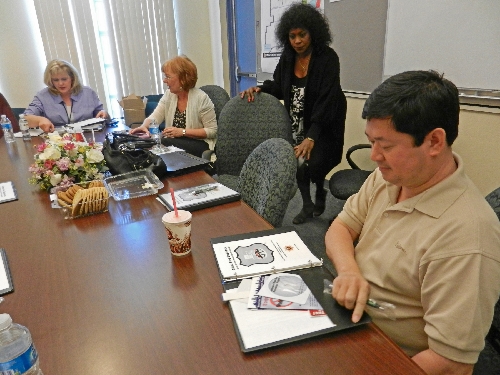Metropolitan Police Department shares safe practices with Las Vegas businesses

Whether it’s vagrants leaving trash or robbers out to make a score, crime comes with owning or operating a business, and the Metropolitan Police Department is out to help stamp it out.
It offers three-hour seminars outlining ways local businesses can be safer.
Kim Lamberty, vice president of operations for Credit Management Association, 3110 W. Cheyenne Ave., Suite 100, knows about crime first hand.
Two months ago, someone broke into the company’s offices and stole some laptop computers, she said.
Before that, the air-conditioning units were taken — twice. Lamberty said she suspects it was for their copper wiring.
Each time, the ground units had to be replaced at a cost of $15,000. To prevent it from happening again, the company had a cage built around them, costing another $10,000.
Credit Management Association also installed a surveillance system and redid the locks.
“I have a hard time getting in now, we have so many keys,” Lamberty said.
Lamberty and her associate, Angie Savage, attended a police department-led seminar April 28 dealing with its Crime Free Business program. The session took place at the Northwest Area Command, 9850 W. Cheyenne Ave. The program is offered at no cost under the department’s Safe Business Partnership program. It was facilitated by Kathy Perkins, a crime prevention specialist, and officer John Schutt.
Being vigilant is half the battle, they said.
“If it doesn’t look right, feel right, walk right … if something really gets your attention, you should step back and say to yourself, ‘I need to evaluate this a little more,’ ” Perkins said.
Tetto Menjivar is the night manager for a Speedy Mart. He said he’s constantly vigilant for any trouble.
“I try different strategies to keep myself aware,” he said.
Menjivar asked how he could best have handled a situation he recently encountered: a loiterer who returned after being asked to leave the premises.
Schutt’s advice was to act as though nothing was amiss and to keep stocking shelves or taking out trash but to secretly call 911 and let the police handle it. He said residents are unequipped to handle such a situation the way officers can.
Being a 24/7 city offers more opportunities to thieves. The police department had suggestions on how to thwart being a statistic. Some were psychological.
Having workers greet anyone who comes through the door is not just an exercise in friendliness. It tells a would-be robber that employees already are aware he’s there and sends a signal that he’s being watched.
“Robbers hate that,” Schutt said.
Criminals often will check out a business to assess how easy it would be to hit, so part of being safe is in everyday habits. Keeping the store tidy and free of overstock boxes sends a signal that employees are not likely to be lax in other areas.
The police department has had a former criminal go into stores to identify areas where the owner was setting himself up to be robbed.
Other ways to keep from being a target include adequate lighting, placement of stock (beer, for example, should be kept at the back to discourage grab-and-run tactics) and keeping windows free of posters.
No matter how vigilant one is, being a target is still a possibility.
If a robbery is in progress, workers should cooperate , b ut they should also take note of different things about the robber, such as an accent, tattoos, crooked teeth, even the shoes — jackets are easy to shed once a robber leaves the store, not so with the shoes. Knowing if the gun barrel was 5 inches long or closer to 10 also are details that help police.
Materials were handed out as part of the program — a height marker to stick by the door and signs reminding employees to clear out the cash register and stash the cash in the safe.
If a robbery occurs while another employee is out of sight, Schutt said, be sure to tell the perpetrator so he’s not surprised and panics if the employee steps out of the back room. Schutt said supplying such information lets the robber know his victims are cooperative, which makes violence less likely.
Menjivar had a plan should he suspect he’s about to be robbed. He needs only to touch the cell phone on his belt, and it calls 911. Then he’ll leave the line open.
“That way, 911 can record what’s going on,” he said.
Contact Summerlin and Summerlin South View reporter Jan Hogan at jhogan@viewnews.com or 387-2949.